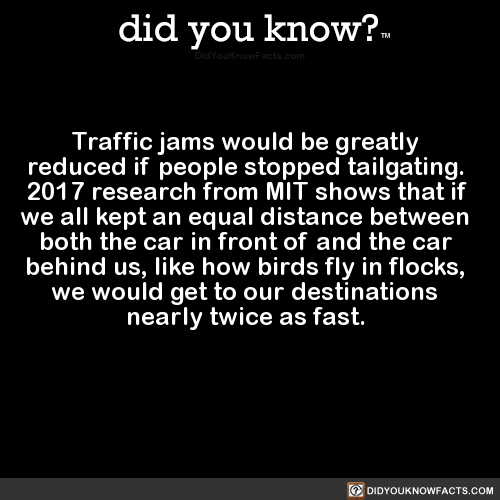wetwareproblem:cipheramnesia:ms-demeanor:did-you-know:Traffic jams would be greatly reduced if peopl
wetwareproblem:cipheramnesia:ms-demeanor:did-you-know:Traffic jams would be greatly reduced if people stopped tailgating. 2017 research from MIT shows that if we all kept an equal distance between both the car in front of and the car behind us, like how birds fly in flocks, we would get to our destinations nearly twice as fast. (Source, Source 2)I would like to introduce you all to a game I call “The Traffic Game” and here’s how it goes: your goal is to hit the brakes less than the person in front of you. You do this by leaving enough distance to not have to hit your breaks all that much and by watching traffic patterns to let your speed and momentum adjust accordingly. Count the number of times the person in front of you brakes and try to keep your number lower - when you have to use the brakes reset your count to zero.I think my record is 21. Another good variation of this in *good* traffic is the “How Long Can I Stay Off The Brakes” game. Can you make it all the way home without braking?(these “games” keep your attention on traffic, maintain following distance, train you in situational awareness, and also save you a hell of a lot of gas while making stop-and-go traffic less blood-boilingly infuriating because now you’re not stopping as much)I have this theory that there is an inverse relationship between how well I drive and how much I use the breaks, and my goal is to be so aware of the road around me that I can exclusively use coasting or trans breaking to slow as needed with the flow of traffic.Additional note: I saw another paper a while back that analyzed how to disperse traffic jams that were already happening.The single best thing you can do as a driver? Drive slightly below the limit.This tends to spill out buffer room between you and the car in front, which gives time for more cars at the front of the jam to clear it before you enter - reducing its size. -- source link
Tumblr Blog : didyouknowblog.com
